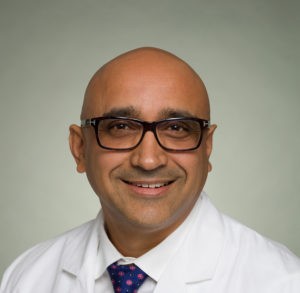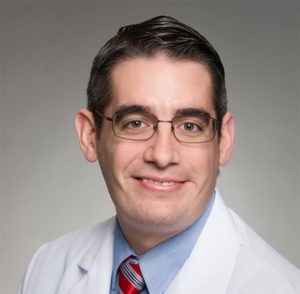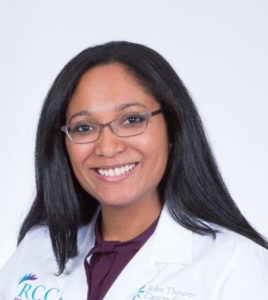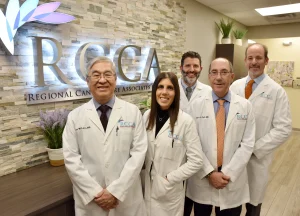
PSMA Therapy for Metastatic Prostate Cancer
A targeted, infused therapy that delivers radiation directly to cancerous cells has been shown to extend survival in many patients with metastatic prostate cancer. The
HIPAA Alert: Potential Data Breach Learn More
Questions on Oncology, Hematology and/or Infusion Clinical Services due to COVID-19 Crisis – CALL 833-698-1623
Important Information for Our Patients Regarding the Coronavirus.
RCCA Providing Area Cancer Patients with Access to Care During Coronavirus Outbreak
RCCA Offering Patients Virtual Visits During Coronavirus Pandemic
Answer: Men.
“The rate of new cases of colorectal cancer was 33% higher in men than in women from 2015 to 2019,1 the last period for which we have comprehensive statistics,” explains Bhavesh Balar, MD, a board-certified medical oncologist and hematologist who sees patients at RCCA’s Freehold and Holmdel, NJ offices. “That difference translates into 41.5 cases per 100,000 men versus 31.2 cases per 100,000 women,”1 he notes.
Dr. Balar adds, “Despite this difference, colorectal cancer is a serious health threat to women as well as to men. It is the third most common cancer diagnosed in both men and women, excluding skin cancers,2 and the third leading cause of cancer-related death for both.3 “We’re highlighting the increased incidence in men not so that women will be less concerned about their risk but to help men have an accurate sense of their chances of developing the disease and to take appropriate steps, such as adopting risk-reducing lifestyle habits and having colonoscopies.”

The oncologist explains that while researchers are exploring why men are more likely than women to be diagnosed with CRC, there are some indications that the elevated risk is driven by sex-based differences in lifestyle factors, such as consumption of processed meats.1 He also notes that the higher rate of diagnoses in men declines with age, with roughly equal numbers of men and women aged 65 years and older being diagnosed with CRC each year.1 He adds that this parity among older people reflects the fact that women have a higher life expectancy than men.1
Answer: Dairy consumption
RCCA oncologists note that consuming about 400 grams a day of dairy products reduces the risk of colorectal cancer by about 10%.1 They add that an 8-ounce glass of milk or 8-ounce container of yogurt contains about 250 grams.4 The cancer specialists note that regular physical activity has an even greater impact, reducing the risk of colon cancer by roughly 30%.1
Beyond taking positive steps to reduce risk, it also is important to avoid activities that increase the risk of colon cancer, RCCA’s oncologists note, explaining that averaging more than three drinks of alcohol per day is associated with a 30% increase in risk for CRC, while eating 100 grams or more of red meat per day is linked to a 10% elevation in risk.1
3. Roughly what percentage of cases of colorectal cancer are attributable to lifestyle factors that people can modify?
Answer: 55%
“While people are aware of the major role that smoking plays in lung cancer and of how a history of sunburns increases risk for melanoma, many do not realize that more than half of all cases of colorectal cancer arise, in large measure, due to things we can change,”1 says Joseph McLaughlin, MD, a board-certified medical oncologist and hematologist who treats patients at RCCA’s Manchester, CT office.
Dr. McLaughlin adds, “The development of any cancer typically involves a complex interplay between many factors, including genetics, environmental exposure, and behavior. While we can’t control genetic predisposition to a disease or guarantee that someone will not develop colorectal cancer even if he or she ‘does all the right things’ in terms of lifestyle, the fact that we can significantly reduce our risk for CRC through adopting healthy habits and obtaining regular medical care hopefully is extremely encouraging – and motivating.”

Beyond exercising regularly and limiting or avoiding red meat and alcohol, as cited above, maintaining a healthy weight and not smoking also can reduce risk, as can avoiding processed meats.1 The impact of obesity is more pronounced in men than in women when it comes to CRC risk, Dr. McLaughlin notes, explaining that a body mass index (BMI) of 30 kg/m2 or greater, which is how many health organizations define obesity, increases a man’s risk of colon cancer by 50% and a woman’s risk by 10%.1 Similarly, he notes, obesity does not appear to increase the risk of rectal cancer in women, but raises men’s risk by 30%.1
Answer: 20-49 years
“The overall rate of new colorectal cancer diagnoses has fallen for the last couple of decades, but that welcome news is accompanied by two important caveats,” says Tracy Proverbs-Singh, MD, MPH, a board-certified medical oncologist who treats patients at RCCA’s Hackensack and North Bergen, NJ locations. “First, the rate of decline has slowed, from roughly 3% to 4% each year in the 2000-2010 period to 1% per year in the past decade or so.1 Second, that reduction in the overall rate of new cases is driven largely by people ages 65 and older.1 The rate has been stable in people ages 50 to 64 years and actually is increasing in those aged 20 to 49 years.1″

Dr. Proverbs-Singh adds, “The number of cases in younger individuals remains below that of older people. In fact, people aged 49 years and younger represent only about 13% of all new diagnoses of CRC. However, the trend in terms of rate of diagnoses in this age group is heading in the wrong direction, which is to say up, and that is worrisome.” The medical oncologist, who has a practice emphasis of gastrointestinal cancers, adds that while researchers continue to investigate why more younger people are being diagnosed with colorectal cancer, early indications suggest that obesity, diet, and sedentary lifestyles may play a role.
“The increase in cases in younger and middle-aged adults underscores the importance of taking steps to optimize your health, to promptly see your physician should you have any concerning symptoms, such as blood in the stool or toilet bowl, and to begin having colonoscopies at the recommended age,” she notes. Dr. Proverbs-Singh explains that the American Cancer Society recommends that people at average risk for colorectal cancer start screening with colonoscopy or another method at age 45.5 “People who are at elevated risk by virtue of family history, a personal history of inflammatory bowel disease, or some other factor typically should begin screening at an earlier age and should talk with their physician about the approach best suited to their specific situation,” she adds.
“By enabling identification and removal of precancerous polyps, colonoscopy plays a major role in reducing the risk for CRC. And if, unfortunately, colonoscopy reveals the presence of cancer, that finding enables us to begin treatment sooner than we otherwise would, and this can have a significant positive impact on outcomes,” the physician adds.
Answer: Declined
“The colorectal cancer death rate declined during the decade from 2011 to 2020, falling by about 2% annually in White, Hispanic, Asian American, and Native American people and by roughly 3% in Black people during that period,” explains Seth H. Berk, MD, a board-certified medical oncologist and hematologist who practices at RCCA’s Moorestown, NJ office.
Dr. Berk adds, “This decline is due in large measure to the fact that the last several years have seen a dramatic expansion in the therapies we have available to treat colorectal cancer at every stage of the disease, including when it has metastasized to other parts of the body. In addition to surgery, radiation therapy, and chemotherapy, we now can offer patients immunotherapies that harness the power of their own immune system to fight cancer and targeted therapies that act against specific cellular mutations. Further, we now have the evidence needed to take a very individualized approach to combining or sequencing those different therapies in a way that is likely to be most effective for a particular patient.”

The cancer specialist stresses that the impact of these therapies derives not just from the efficacy of a particular drug or approach but from their widespread availability. “People with colorectal cancer do not need to travel to a major academic medical center in a distant city to receive the latest in care. We’re providing these highly sophisticated, evidence-based regimens right here in the community setting, so that people can receive cutting-edge treatment at centers close to their home and where their oncologist knows and can coordinate closely with their surgeon, their primary care physician, and their other doctors. While new therapies have revolutionized cancer care in recent years, there also has been a parallel, less-noticed revolution in terms of delivering care that is both comprehensive and highly personalized at community-based centers that are very accessible and convenient for the patient,” he says.
Dr. Berk continues, “For all of the very real progress we have made against colorectal cancer, we have much further to go. The 5-year relative survival rate for localized CRC stands at 91%. However, when cancer has spread to nearby organs or lymph nodes in the region – as is the case in about one-third of newly diagnosed people — that rate drops to 73%, which underscores the importance of early detection.3 And for all of the favorable statistics we can cite, the number that matters most is 52,550. That’s how many people in the United States are expected to die from colorectal cancer in 2023.1 Everyone here at RCCA is committed to driving down that number, and to do so by providing our patients with outstanding, compassionate care and access to the latest therapies and clinical trials.”
*******
Drs. Balar, McLaughlin, Proverbs-Singh, and Berk are among the 90+ cancer specialists who treat patients at more than 20 RCCA care centers located throughout New Jersey, Connecticut, Maryland, and the Washington, DC area. RCCA oncologists and hematologists see more than 23,000 new patients each year and provide care to more than 225,000 established patients, collaborating closely with their patients’ other physicians. They offer patients the latest in cutting-edge treatments, including immunotherapies and targeted therapy, as well as access to a wide range of clinical trials. In addition to serving patients who have solid tumors, blood-based cancers, and benign blood disorders such as anemia, RCCA care centers also provide infusion services to people with a number of non-oncologic conditions—including multiple sclerosis, Crohn’s disease, asthma, iron-deficiency anemia, and rheumatoid arthritis—who take intravenously-administered medications.
To learn more about RCCA, call 1-844-346-7222 or visit RCCA.com.
References
For more information or to schedule an appointment,
call 844-346-7222. You can also schedule an appointment by calling the RCCA location nearest you.

A targeted, infused therapy that delivers radiation directly to cancerous cells has been shown to extend survival in many patients with metastatic prostate cancer. The

Patients receiving treatment from Regional Cancer Care Associates in Moorestown are in good hands. Five of its physicians — Dr. Seth Berk, Dr. Maurice Cairoli, Dr.

The world of cancer treatment is rapidly evolving. New therapies are being discovered, and existing ones have improved, resulting in better patient outcomes. Regional Cancer

Regional Cancer Care Associates is one of fewer than 200 medical practices in the country selected to participate in the Oncology Care Model (OCM); a recent Medicare initiative aimed at improving care coordination and access to and quality of care for Medicare beneficiaries undergoing chemotherapy treatment.